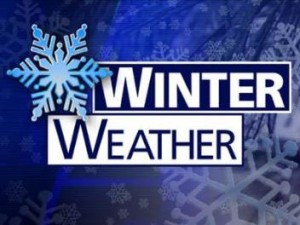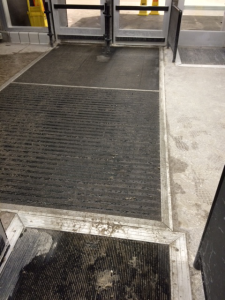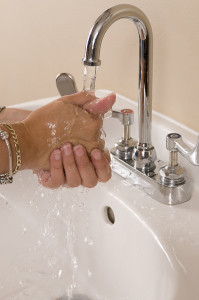Don’t Get Left Out In The Cold
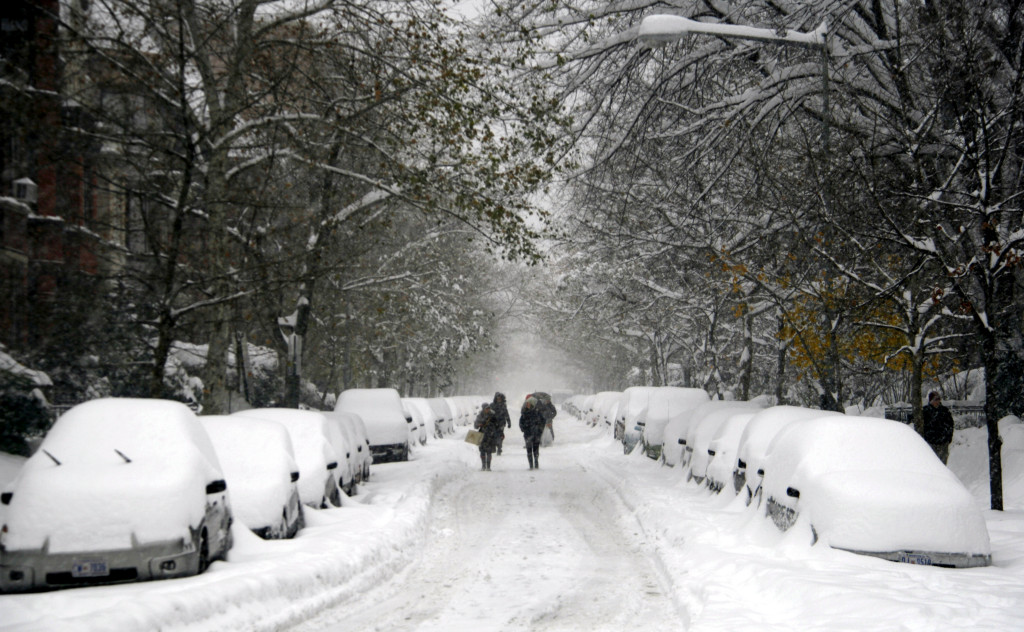 With the holiday season now behind us, we have entered the dark and dreary winter months of January and February. In many regions of our country, especially the Upper Midwest and Northeast, these are the months many dread. Skiing buffs and ice fishing enthusiasts aside, many anxiously count the days down until the winter is behind us and spring is on the horizon.
With the holiday season now behind us, we have entered the dark and dreary winter months of January and February. In many regions of our country, especially the Upper Midwest and Northeast, these are the months many dread. Skiing buffs and ice fishing enthusiasts aside, many anxiously count the days down until the winter is behind us and spring is on the horizon.
While spring is associated with many different things, one of the most common activities is known as “Spring Cleaning”. This is regarded as the time when everyone wakes from their long winter slumber and tackles those daunting cleaning tasks which have been ignored the past three, four, maybe five months. That strategy may work on the residential front, but those of you in professional building maintenance know that proper cleaning and maintenance do not take the winter off. Actually, winter presents its own collection of additional maintenance activities and procedures which must be followed in a professional environment. Whether you work in an educational, healthcare, retail, industrial, or general office setting, winter maintenance tasks are not optional and cannot be put off until spring.
Following are ten winter maintenance tips and reminders to help your facility operate smoothly while we eagerly anticipate spring.
-
Ensure all seals to the building envelope are sealed.
A maintenance staff worker has many responsibilities and wears many hats. When you get down to the main point of your position, you are responsible for the health and comfort of those in the facility, whether they are employees or guests. Ensuring that the gaps between the exterior wall and both windows and doors are properly sealed is an important step toward the comfort goal. Simple tasks such as air sealing those gaps will prevent heat from escaping the facility and keep everyone inside warm and comfortable. Fellow employees will be more productive, guests will feel at ease, and customers will likely stay longer and purchase more.
-
Inspect, Clean, and Replace HVAC filters.
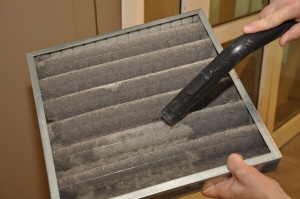 One of the positives not mentioned in the previous entry was increasing the energy efficiency of your facilities HVAC system. This cost savings will be appreciated by those responsible for the facility’s energy bills. Another way to increase the efficiency of the heating system and increase comfort is to inspect all filters associated with your HVAC system. Filters which are dirty need to be cleaned. Filters which are old and/or extremely dirty need to be replaced. The end result will be a heater that is more efficient and less likely to cause health issues for you and everyone else in the building.
One of the positives not mentioned in the previous entry was increasing the energy efficiency of your facilities HVAC system. This cost savings will be appreciated by those responsible for the facility’s energy bills. Another way to increase the efficiency of the heating system and increase comfort is to inspect all filters associated with your HVAC system. Filters which are dirty need to be cleaned. Filters which are old and/or extremely dirty need to be replaced. The end result will be a heater that is more efficient and less likely to cause health issues for you and everyone else in the building.
-
Ensure surge protectors are being used.
Preventative maintenance is a crucial component of winter maintenance. Many winter emergencies can be prevented with the proper prevention. However, we are powerless when it comes to stopping a winter storm. Among the many issues brought upon by heavy doses of snow, sleet, and ice is the ever present danger of power outages. Industrial equipment commonly is installed with the proper safeguards and healthcare facilities utilize back-up generators.
For those of you entrusted with the maintenance of offices, schools, and some retail facilities, it is important to prepare and be ready for those un-preventable winter storm power outages. Ensuring as much offices equipment and appliances as possible are plugged into surge protectors will guard against a sudden load demand impact when power is restored.
-
Have emergency staffing plans in place.
Winter storms can cripple entire regions from a transportation standpoint. In many cases, people are unable to leave their homes. Some people may be able to work at home, away from the facility. That is impossible for those of us in our industry since our facility is our job. Realizing that side streets, highways, and public transportation could all be impacted by winter storms means making sure all necessary shifts are covered. Even if an office or school is closed for the storm, there should be maintenance personnel on site to check that everything is operating smoothly and to act if there is a storm-related facility emergency.
-
Keep Jan San Chemical Inventory Up
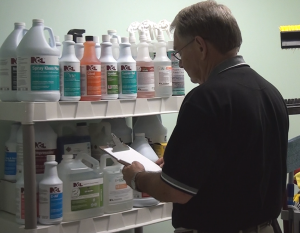 During winter storms, the travel conditions are not only treacherous or impossible for maintenance staffs, but the case remains the same for Jan San suppliers. Regular delivery may be delayed either the day(s) of the storm or beyond when suppliers have to catch up on missed deliveries from previous days. Be sure your janitorial closest is properly stocked with your jan-san needs, especially the everyday essentials: neutral floor cleaner, restroom cleaner, bowl and urinal cleaner, disinfectants, hand soaps, and glass and multi-surface cleaners. Facilities which have food service operations need to have an ample supply of kitchen sanitizer, grille and oven cleaner, and dish detergent.
During winter storms, the travel conditions are not only treacherous or impossible for maintenance staffs, but the case remains the same for Jan San suppliers. Regular delivery may be delayed either the day(s) of the storm or beyond when suppliers have to catch up on missed deliveries from previous days. Be sure your janitorial closest is properly stocked with your jan-san needs, especially the everyday essentials: neutral floor cleaner, restroom cleaner, bowl and urinal cleaner, disinfectants, hand soaps, and glass and multi-surface cleaners. Facilities which have food service operations need to have an ample supply of kitchen sanitizer, grille and oven cleaner, and dish detergent.
-
Do not let your jan-san chemicals freeze.
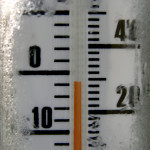 In many facilities the temptation is to put janitorial chemicals in a back warehouse which is not heated. This decision can easily turn into maintenance and budget disaster. Most cleaning chemicals are not formulated to be stored in freezing atmospheres. In many instances, frozen chemical cleaning solutions must be discarded. That results in wasted dollars, while also putting the facility at risk of being without vital cleaning products at a time of year when weather can delay product shipments for extended periods of time.
In many facilities the temptation is to put janitorial chemicals in a back warehouse which is not heated. This decision can easily turn into maintenance and budget disaster. Most cleaning chemicals are not formulated to be stored in freezing atmospheres. In many instances, frozen chemical cleaning solutions must be discarded. That results in wasted dollars, while also putting the facility at risk of being without vital cleaning products at a time of year when weather can delay product shipments for extended periods of time.
-
Do not forget the windows
The cold winter months with limited daylight is not the time to get lazy with cleaning windows. The longer dirt and soils stay on windows, the more difficult it will be to remove the accumulation of soils on the window surfaces. That accumulation will also diminish the sunlight entering the facility during the daytime. Not only is the sunlight a source of warmth in the cold winter months, but its presence also contributes to a more positive work environment.
-
Safety first
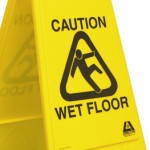 One of the biggest responsibilities of the maintenance staff at a facility is the safety of those inside and around the building. During other times of the year, extra precautions are taken during rain events to guard against accidents, such as slip and falls. Snow events pose an even greater risk. Snow and ice melt compounds are tracked in on everyone’s shoes every day until all remnants of the snow storm have melted away. This time of year, more than ever, is important to use as much walk off matting as possible. The best option this time of year is matting which is deep, to capture and hold in the melted snow, ice, and water from outside before it makes it to the flooring surfaces.
One of the biggest responsibilities of the maintenance staff at a facility is the safety of those inside and around the building. During other times of the year, extra precautions are taken during rain events to guard against accidents, such as slip and falls. Snow events pose an even greater risk. Snow and ice melt compounds are tracked in on everyone’s shoes every day until all remnants of the snow storm have melted away. This time of year, more than ever, is important to use as much walk off matting as possible. The best option this time of year is matting which is deep, to capture and hold in the melted snow, ice, and water from outside before it makes it to the flooring surfaces.
Even if the sufficient walk off matting captures most of the moisture, some will make its way on to the floor. Along with that moisture, residue from ice melt compounds is also tracked inside and on to the flooring surfaces. Application of ice-melt compounds in parking lots and sidewalks leading up to a facility is not an option. It is a vital component to preventing potentially libelous accidents from occurring on dangerous ice. The negative side effect is the high alkaline residue will damage the integrity of your floor’s coating and disrupt the pH balance of the flooring surface. For this, NCL produces pH-Enomenal Floor Care Neutralizer and Conditioner to balance the pH of a floor after stripping and to remove ice melt compounds from entranceways. Rinse Away Plus Carpet Rinse and Residue Neutralizer is a mild organic acid rinse to safely neutralize excess alkalinity from carpeted surfaces, while removing embedded residue.
Winter is the season where most people’s health decreases. Cold and Flu season can spread like wildfire through a facility. The over-exposure to frigid temperatures decreases the body’s resistance to germs and viruses. Some will bring their illness to work from home, and you cannot prevent that. What you can do, however, is provide an atmosphere that does not encourage the spread of those germs to others. The best, most effective, and easiest personal line of defense against these germs is to routinely wash your hands. Maintenance staffs are responsible for keeping restrooms fully stocked with hand soaps, along with keeping hand sanitizer dispensers stocked throughout other areas of the building. The use of effective quaternary disinfectants can stop the spread of harmful bacteria and viruses.
These are ten steps in overall winter facility maintenance. Do you feel there is a step we forgot? Is there a step you practice every winter that has proven to be successful. Or, anything else you would like to add? Feel free to share it in the comments section below.
 English
English Español
Español
